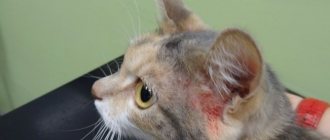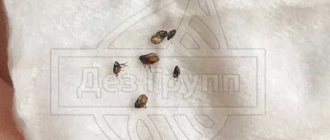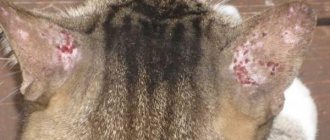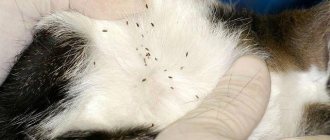Let's try to analyze the main reasons why a cat can constantly itch and lick itself, but it does not have fleas and, perhaps, never had any. What, then, is extremely troubling to your pet?
Cats are recognized as naturally clean people; they regularly take care of their fur, diligently brushing it and licking it thoroughly. This is the instinct of a predator, inherited by our pets from predatory ancestors. Therefore, catching a cat washing itself is a common occurrence.
But if a cat often licks and scratches beyond measure, this always causes justified fears among loving, attentive owners - it means that something wrong has happened to their pet. This restless behavior is a consequence of your pet being constantly itchy, but not necessarily due to fleas.
Various factors can contribute to the occurrence of severe itching. Therefore, a symptom such as scratching and licking should be a good reason to search for the cause and eliminate it as quickly as possible. Most likely, you will need a visit to the veterinarian, where it will be found out exactly why the cat is itching, and your beauty will receive adequate treatment.
With prolonged intense scratching, wounds, bald spots, irritation and damage to the skin occur, turning into an open gate for new infections, and your cat is at risk of secondary infection, which is even more difficult to fight. This is why it is so important to address the cause of the itching early so that your cat can recover faster.
Causes of itching in cats
Fleas on an animal
The most common probable cause of your cat itching all the time is a flea attack. But if you are sure that there are no fleas at the moment, then know that an allergy to a flea bite in some four-legged animals can last up to 6 weeks. Therefore, it is not surprising that the cat continues to worry all this time, although the fleas have been gone for a long time.
But when the cat is domestic, does not leave the apartment and it really does not have fleas, then the most likely reasons for constantly scratching and licking its fur may be the following problems:
- helminth infection;
- skin and other bacterial inflammations;
- ringworm and other fungal infections;
- lice, lice, mites and other external parasites;
- allergic manifestations of various origins;
- psychogenic factors;
- hormonal disorders.
Below we will take a closer look at each of the most common reasons why, in the absence of fleas, a cat is worried about severe itching, but in reality there are many more of them.
Parasitic infestations
Fleas are not the only parasites that live on the skin and fur of a pet. If your cat is constantly itching and acting restless, then it is worth checking him for the presence of the following types of insects:
- Ticks. Causes notoedrosis, sarcoptic mange and ear scabies;
- Vlaseaters. Common ectoparasites that live in animal fur and feed on the epidermal cells of a pet;
- Helminths. Unlike external parasites, tapeworms live inside the cat's body. They cause severe itching of the skin all over the body, indigestion, deterioration of stool, sour eyes, sudden changes in the habits and behavior of the pet.
Parasitic infestations are treated after prior consultation with a veterinarian. He will select a suitable drug, used topically (against parasites on the skin and fur) or internally (against worms).
Treatment for ticks, lice eaters, and fleas involves the use of special products: drops, sprays, shampoos. The medications will not only help remove fleas and other parasites, but will also relieve itching.
Treatment for skin insects is simple, but systematic. Don't forget about prevention. Products are used in the form of ointments, gels, sprays, shampoos or drops. They are designed to destroy itching pathogens.
Itching in cats and kittens from helminths
Worms are disruptions in the digestive system, loss of vitamins and nutrients under the influence of the parasitic environment inside the body. Due to the lack of important components, the animal’s skin suffers, it dries out, and severe itching occurs.
Helminthiasis causes intoxication of the body, allergies appear and, as a result, skin rashes and itching. Given the cat's fur, the rashes are not easy to see. First of all, it is important to exclude the presence of worms in pets. After all, even to a newborn kitten they can be transmitted from the mother.
There are types of worms that can easily enter the body through the bites of blood-sucking insects (fleas).
Helminthiasis must be treated without fail, because it is not only external itching, but also a detrimental effect on the body. The development of small kittens does not proceed properly if parasites have settled inside. In cats, worms provoke miscarriage or premature birth.
Treatment and prevention are carried out for all residents of the house, because this disease is easily transmitted. More often, the veterinarian prescribes the following drugs: Drontal, Pyrantel, Febtal, Trontsil K, Polyvercan.
Before starting treatment, it is necessary to undergo tests and determine the type of parasite so that the treatment is effective and not so harsh on the animal’s body.
Infection with helminths as a cause of itching
Helminth
Helminths, if not regularly combated, can significantly annoy your pet, undermining its health from the inside.
The consequences of the vital activity and reproduction of worms in a cat’s body can be many troubles that bring suffering to your pet no less than fleas:
- The cat feels discomfort in the anus, itches and licks it;
- her stool and digestion are disrupted, her appetite is distorted;
- the coat becomes dull and the skin becomes dry and flaky;
- eyes turn sour;
- behavior becomes abnormal: apathetic or, on the contrary, excited.
Even the smallest kitten can suffer from worms if it is infected from its mother.
To prevent infection with worms, regularly clean with anti-helminth medications.
Allergy
A cat does not always itch from fleas; an allergic reaction can also cause an itching sensation. It may be caused by changes in diet, the use of an anti-flea collar or an antiparasitic agent aimed at combating fleas, ticks and other bloodsuckers. A similar reaction of the body occurs to plant pollen, house dust, and also when using medications.
Only a veterinarian can determine the factors that can cause allergies in a cat, as well as the treatment method.
Skin and other inflammations in cats caused by bacteria
Here we will touch only on those processes that provoke itching in different parts of the body and force the animal to scratch itself regularly.
Pyoderma
This is a severe bacterial infection of the superficial, or less often deeper, layer of the skin. The consequences of pyoderma are:
- the cat may go bald;
- become covered with pustules and crusts;
- the animal finds no peace, constantly itches furiously and meows.
Cats of all breeds are equally susceptible to infection, but the risk of complications is more often observed in animals with folds on the body, so the owners of such beauties have to be especially careful.
If the lesion has not affected the deeper layers and there are no complications, then recovery occurs quickly at home, but under veterinary supervision.
Ear infection
Symptoms of otitis media in a cat
Otitis in cats can provoke, in addition to severe pain and depression, a desire to scratch the sore ear with a paw.
The need to eliminate itching by frequent scratching results in the appearance of wounds and cuts, because the cat’s claws are sharp! Complete or partial baldness around the affected ear is also possible.
Treatment depends on whether the otitis media is caused by ear mites or bacteria. Therefore, it is better to visit a veterinarian, he will do a scraping for analysis and prescribe the necessary type of treatment.
Prevention
The cat constantly asks for food and yells, but does not eat enough
Of course, it is impossible to take everything into account and protect your pet one hundred percent. But there are general recommendations that will help reduce the risk of developing any problems.
- You need to wisely approach the choice of diet for your pet, read messages on forums and articles, and consult with a breeder or veterinarian.
- You should not use chemical detergents to wash cat litter; you should try to ensure that the cat has minimal contact with them.
- It is necessary to promptly treat even small wounds and scratches on the skin so that infection does not get there.
- Do not squeeze the cat with dirty hands without taking off your outdoor clothes and shoes.
- It is not recommended to pet unfamiliar street animals so as not to bring diseases into the house.
- In the spring you need to treat your cat for parasites.
The most important thing to remember is that the disease is easiest to treat at an early stage. If the cat is itching, but there are no fleas, you need to take care of its condition and immediately take it to the clinic. Then, in most cases, treatment will be quick and painless.
Ringworm and other fungal skin infections in cats
Trichophytosis (ringworm)
Take a close look at the areas where your cat scratches most frequently. If there is no hair there, and the bald patch resembles a circle, then it is ringworm.
Important! The disease is caused by a fungal infection. Is contagious to people! Be sure to start treatment as soon as possible!
At home, lichen can be easily and quickly treated in cats, but in people infected from a sick cat, treatment is more difficult.
Dermatomycoses
Fungal and yeast infections of the skin and fur of cats lead to similar symptoms that greatly annoy your pet.
Not dangerous for people. They are treated with specific therapy, which is prescribed by a veterinarian after examination.
Lice, lice, mites and other external parasites that cause itching
These unpleasant “guests,” including fleas, are called ectoparasites. All of them provoke severe itching, flaking of the skin, and hair loss.
The cat is forced to literally scratch its skin, injuring local and large areas.
If treatment is not started in time, secondary inflammation, suppuration, sepsis and baldness may occur.
The most dangerous and difficult for cats are:
- ear scabies - a mite that settles in the external auditory canal;
- sarcoptic mange, which affects various parts of the cat's body;
- notoedrosis, localized mainly on the face.
The animal is experiencing serious suffering, so it is better to begin treatment as soon as possible.
The cat itches, chews itself, constantly licks itself: is this normal?
If an animal itches due to severe itching, then with sharp claws it damages the skin, causing infection.
During severe itching, severe irritation of pain receptors occurs, because of this the animal begins to lick and chew itself. The skin on the affected area turns red and wounds appear. The reasons for this condition are different. To relieve the symptom and understand what to do, the pet must be shown to a doctor.
When it's ok
Cats are clean creatures. They wash themselves after sleep and after eating. If your pet eats natural food, then after licking the fur it will smell like the food it ate.
The smell of eaten herring is especially strong. If the animal licks itself too much, then it needs a medical examination.
Signs of a pathological condition of an animal
The painful condition can be determined by itching of the skin or ears. With skin itching, you can notice how the cat itches a lot and tries to bite the source of its anxiety from under the skin with its teeth.
When the itching is localized in the ear, the cat tries to stick its paw deep into it to scratch.
During this period you may notice:
- constant scratching of the body with a plaintive meow;
- pronounced biting of the skin;
- hair loss, deterioration of its appearance;
- the appearance of dandruff, oily scales;
- the skin is covered with ulcers or red rashes in the form of small spots;
- parasites or their excrement are visible on the skin.
It is easy to help an animal if you notice deviations in behavior in time and take him to the clinic. An advanced disease is more difficult to cure.
Allergic manifestations that cause itching
The cause of an immune attack in the form of dermatitis can be many factors, so identifying the allergen is easier to do by exclusion.
Nutritional factor
The most common complaint is itching. Here the easiest way is to identify the “culprit” by eliminating one of the components from the diet one by one. It’s better to remember and analyze when the problem arose and what it might be related to. Perhaps it was a transition to a new food.
Contact factor
When the influence of food and all of the above reasons is excluded, and the cat continues to itch intensely, he may be allergic to pollen from indoor plants, dust, air freshener, washing powder or soap, or shampoo.
Drug factor
If your pet is currently or recently on medication or has had a vaccination, stop treatment and wait. Drug dermatitis will go away on its own.
A must read!
Here were listed the main causes of itching that cause a cat to have a terrible desire to scratch. But there are many more reasons! It may well be that your pet licks its fur simply because it wants to scratch. But in any case, you need to monitor his behavior, namely, scratching, scratching and biting his own limbs.
To prevent the itching from returning, you should get rid of the cause rather than treat the symptoms. And for prevention, we recommend that you properly care for your cat and keep your beloved pet’s skin clean.
Hormonal imbalances that cause scratching
In fact, there are few of them, but some are not so rare. Therefore, it is better to have an idea about them when analyzing the causes of excessive itching.
Thyroid dysfunction
Both hypothyroidism and hyperthyroidism cause baldness, dandruff, itching, and tangled fur in cats.
Cushing's syndrome
Disruption of the adrenal cortex in the direction of intensification. Provokes alopecia on the sides and back. The skin becomes thinner, loses elasticity and strength. Visible comedones appear.










